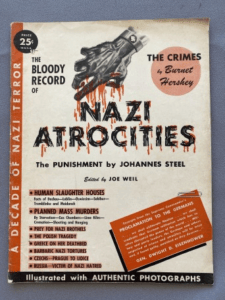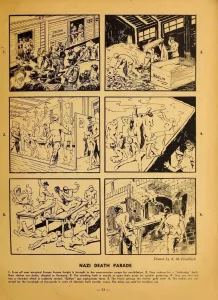The Holocaust Comic Strip 35 Years before Maus
Skip to commentsIn early January 1945, just before the liberation of Auschwitz, a small group of journalists and artists, many of them European immigrants, published a roughly 50-page pamphlet titled The Bloody Record of Nazi Atrocities. Printed by Arco Publishing Company, a small imprint based in New York, it combined previously circulated photographs, drawings and text with newly commissioned works documenting the mass killings of European Jews, Roma and Sinti. Though the victims’ ethnicity was the main reason the Third Reich targeted them, the pamphlet largely omitted this fact in favor of presenting a broader narrative of Nazi inhumanity that generated support for the Allied war effort.
Within The Bloody Record, a six-panel comic takes up an entire page. Titled “Nazi Death Parade,” it depicts the arrival of prisoners at an unnamed concentration camp. The inmates are stripped of their belongings and clothing and given showers to “open their pores for quicker poisoning” before being gassed to death. The last two panels show Nazi soldiers salvaging victims’ gold teeth and shoveling a corpse into an oven for cremation; the final caption notes that “the ashes are sold for fertilizer use.”
Kees Ribbens, a historian at Erasmus University Rotterdam and the NIOD Institute for War, Holocaust and Genocide Studies, believes that “Nazi Death Parade” is the earliest known comic depiction of the horrible endpoint of the Shoah. He’s fascinated by the choice of medium. After all, why would one use “the funnies” to present this grim testimony?
Ribbens is equally invested in learning more about the man who created “Nazi Death Parade”: not a young American Jew, as one might expect of the period’s comics industry, but a classically trained Austro-Hungarian émigré named August Maria Froehlich—a man then in his mid-60s.
Esther Bergdahl, for Smithsonian Magazine, explores the background
of Nazi Atrocities illustrator and comic artist A. M. Froehlich.
Lambiek’s Comiclopedia entry for A. M. Froehlich.


Comments 1
Comments are closed.